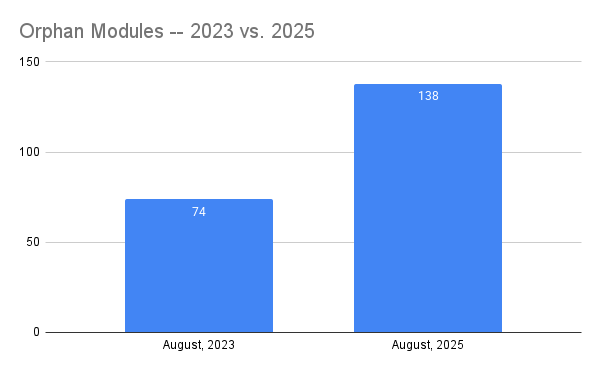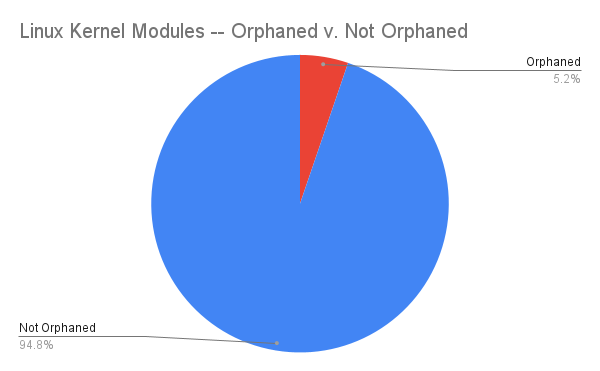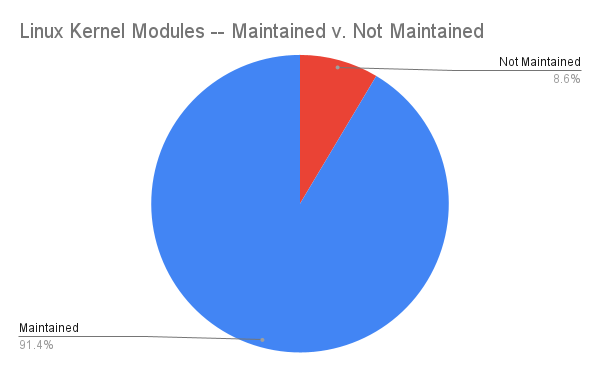Over the last few days, a number of Linux Kernel modules have officially become “Orphaned” — meaning they no longer have a maintainer to look after them in any way.

This most recent surge in “Orphan” Linux Kernel modules is due to a round of fairly massive layoffs happening at Intel, with the company reducing total staff by tens of thousands before the end of this year.
And, of course, among those being laid off are multiple programmers who were paid maintainers of Linux Kernel modules. Things like the Intel CPU temperature drivers, Slim Bootloader, and the Time of Day clock. All are now “Orphan” modules, with more expected over the coming months.
This isn’t the first event which has caused a surge in Orphan modules.
In October of 2024, a wave of Russian programmers (and programmers suspected of working with Russian companies) were banned from contributing to the Linux kernel. This was in response to President Biden’s Executive Order 14071, which forbade Russians from working with or using GPL'd software made in the USA.
Which, naturally, included the Linux Kernel.
How Many Orphans Are There?
All of which begs the question… exactly how many Linux Kernel Modules now have no maintainer at all?
Figuring that out is a pretty trivial task. Linux Kernel Modules with maintainers (or which had maintainers) are listed in the Linux “MAINTAINERS” file.
And, as of August 8th, 2025, there were 138 Kernel Modules specifically listed as having a Status of “Orphan”.
But that only tells us part of the story. What we really need to know is how fast the number of Orphan Modules is growing… and what percentage, of all modules, are not maintained.
Turns out, both numbers are… not great.

Over the last 2 years — between August of 2023 and August of 2025 — the number of “Orphan” modules in the Linux kernel grew from 75 to 138.
They nearly doubled.
Now let’s look at the percentage of Orphaned Modules.
Since we know that there are roughly 2,496 Modules which have an active maintainer (give or take, based on a quick look at the MAINTAINERS file) that means that a little over 5% of all Linux Kernel modules… are orphans.

Though that doesn’t tell the whole story.
There is also another category of Kernel Module where the status is listed as “Odd Fixes”. Meaning “It has a maintainer but they don’t have time to do much.”
If we consider those modules as also “Not Maintained” (along with the “Orphan” Modules), the total percentage of un-maintained Kernel Modules grows to 8.6%.

The Future of Linux is Unmaintained
Considering the upcoming layoffs at Intel — whose employees are the current maintainers of well over 200 different modules — the possibility of “Not Maintained” Linux Kernel Modules hitting over 10% isn’t a far fetched idea.
And we’re not talking about seldom used hardware drivers here. We’re talking about things like “temperature sensors” and “time of day” (and all manner of critical hardware support like ACPI and Ethernet drivers).
While it’s reasonable to assume that some of the most critical Kernel Modules will get new (often volunteer) maintainers — thus saving them from becoming true “Orphans” — many will fall into an abandoned state. As has been the case over the last few years.
What result that will have on the Linux kernel — and the broader Linux ecosystem — remains to be seen. But we’ll find out soon enough.















